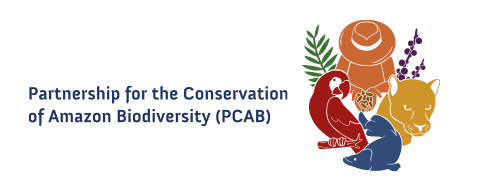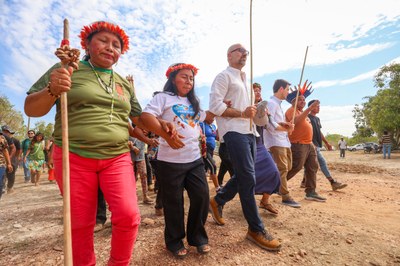CIR Assembly: Fostering Indigenous Peoples' Autonomy and Sustainability
March, 2024 – The 53rd General Assembly of the Indigenous Peoples of Roraima discussed Indigenous access to education and health policy benefits. Members also engage in conversations on the impacts of climate change on local communities, mitigation efforts, new forms of income-generation and the role of women and youth on territorial management and protection among other topics.
Indigenous Peoples' Land, Identity, and Autonomy was the theme chosen for the event – organized and hosted by the Roraima Indigenous Council (CIR). Indigenous leaders delivered a letter to the public authorities attending the CIR Assembly with a list of demands from local communities (read the letter here). Environment and Climate Change Minister Marina Silva, and President of the National Indigenous Peoples Foundation Joenia Wapichana, attended the 1000 person event.
In the letter, Indigenous leaders highlighted their concerns about climate change and its impacts on their territories, noting an increase in the number and severity of both droughts and forest fires. They called for stronger engagement with Indigenous peoples and organizations during the design and development of climate policies, including discussions on carbon market regulation and REDD+ (Reducing Emissions from Deforestation and Forest Degradation), and complying with their rights to free, prior, and informed consultation.
“Our wells are drying up. The communities of Moskow and São Domingos are being affected by water shortages. Forest fires have damaged our crops and affected our production,” explained César Silva, coordinator for the Serra da Lua region.
Jailda Teixeira, women's coordinator at the Barata community, added, “It’s not easy. We are losing all our production. We have no cassava, bananas, or cassava flour and paste. It is all nearly gone. We are many, and we are now being forced to ration our water."
To strengthen the production of Indigenous communities, CIR’s Deputy Coordinator Enock Taurepang announced the creation of an Indigenous fund to serve families and communities.
The CIR Department for Territorial and Environmental Management (DGTA) introduced 64 firefighters who are working to combat fires, as well as the 120 territorial and environmental agents (ATAI) who are supporting the development of management plans and climate change case studies.
Participants attended the four day event at the Raposa Serra do Sol Indigenous Land in the Training and Cultural Center, a historic and sacred site that represents Indigenous peoples' struggle to protect their territories, biodiversity, and well-being.
The CIR Assembly was supported by USAID through the Nossa Terra, Nossa Mãe project, implemented by the International Education Institute of Brazil (IEB) in partnership with local communities. “We are very proud to support this amazing vision, this spirit, and these ideas about how to conserve the environment,” said USAID Director Mark Carrato, during his initial visit.
CIR is one of the largest and strongest Indigenous organizations in Brazil. It represents 270 communities living in 35 Indigenous lands spread over more than 10 million hectares. The 55,000 residents include members of the Macuxi, Wapichana, Ingarikó, Patamona, Sapará, Taurepang, Wai-Wai, Yanomami, Yekuana, and Pirititi peoples.
Training – During the event, 18 Indigenous students received their certificates of completion for cattle farming, beekeeping, fruit farming, product processing, and basic IT training. “Our work is based on three pillars, represented by a book (wisdom), a hoe (work), and a tortoise (patience),” says Davison Blukey, training center coordinator.
Participants discussed community schools and their infrastructure. “By the end of this year, all teachers that passed the latest selection program will start working. Indigenous education has its distinctions and we need specialized people to work in our classrooms,” explains Leonardo Pereira, director of the Indigenous Schools Division.
Find out more about CIR here.



